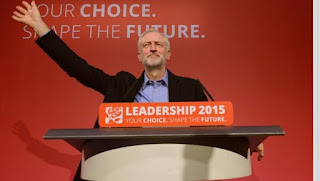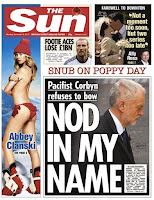 |
| Pic: BBC |
 |
| Tim Yeo filmed by undercover insight reporters |
Bob Satchwell, executive director of the Society of Editors: "Every time journalists write or say: ‘following a Freedom of Information request’ they should send a tenner to the Campaign for Freedom of Information which desperately needs our support to maintain its vital work."
Jon Snow in the Observer defending BBC reporter Graham Satchell for showing emotion while covering Paris terrorist attacks: "Journalism makes no sense to the citizen without some emotional engagement. That doesn’t mean we have to sensationalise, or struggle to be emotional in our reporting. But we do have to tell it like it is. If we deny the impact an event has upon us, we deny not only ourselves, but those who depend on us for at least some of their information."
 |
| The old Manchester Guardian and Evening News building |
John Witherow, editor of The Times, interviewed in Press Gazette: “We have not cut back on journalists, if anything we have invested in them. And that’s our firm commitment... people will only pay for subscriptions if you have quality. You shoot yourself in the foot by cutting back on journalism, because they won’t subscribe and then our whole model falls apart.”
Douglas Jehl, the Washington Post’s foreign editor, after the paper's correspondent Jason Rezaian was jailed for an unspecified term in Iran: “Every day that Jason is in prison is an injustice. He has done nothing wrong. Even after keeping Jason in prison 488 days so far, Iran has produced no evidence of wrongdoing. His trial and sentence are a sham, and he should be released immediately.”
liz gerard @gameoldgirl on Twitter: "There comes a point when @dailyexpressuk crosses the line from ludicrous to irresponsible."
The Guardian bashes the Sun in a leader: "Terrorists only win if they force us to abandon our way of life and instead live in terror. What better way to do their work for them than to make up a story that leaves Britons believing that 20% of a particular community wants to blow them up."
Sun managing editor Stig Abell in a letter to the Guardian: "It is perhaps not surprising that the Guardian chose to get angry at the Sun’s poll in your editorial. It is ironic, though, that the Guardian makes play of complaints to the newspaper industry regulator Ipso [Independent Press Standards Organisation], an organisation it has itself declined to join."
IPSO in a statement on the Sun's front page: "IPSO’s policy when dealing with a large number of complaints about a particular issue that requires investigation is to select a lead complaint. In this case, IPSO has selected MEND (Muslim Engagement & Development) as the lead complaint. We have written to The Sun to inform them that we have commenced an investigation into this matter. As of this morning, Thursday 25th November, IPSO has received around 2,600 complaints relating to the article. The majority of these refer to Clause 1 (Accuracy) of the Editors’ Code of Practice."
[£]=paywall
The Guardian bashes the Sun in a leader: "Terrorists only win if they force us to abandon our way of life and instead live in terror. What better way to do their work for them than to make up a story that leaves Britons believing that 20% of a particular community wants to blow them up."
Sun managing editor Stig Abell in a letter to the Guardian: "It is perhaps not surprising that the Guardian chose to get angry at the Sun’s poll in your editorial. It is ironic, though, that the Guardian makes play of complaints to the newspaper industry regulator Ipso [Independent Press Standards Organisation], an organisation it has itself declined to join."
IPSO in a statement on the Sun's front page: "IPSO’s policy when dealing with a large number of complaints about a particular issue that requires investigation is to select a lead complaint. In this case, IPSO has selected MEND (Muslim Engagement & Development) as the lead complaint. We have written to The Sun to inform them that we have commenced an investigation into this matter. As of this morning, Thursday 25th November, IPSO has received around 2,600 complaints relating to the article. The majority of these refer to Clause 1 (Accuracy) of the Editors’ Code of Practice."
[£]=paywall










































